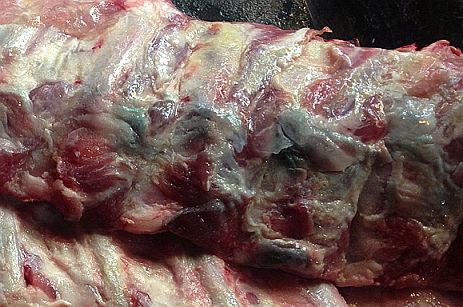What Causes Pork To Smell Like Eggs?

The smell of eggs in pork can be caused by two main factors: boar taint and spoilage. Boar taint occurs in uncastrated male pigs and is caused by hormones that can give off a strong, musky odor. This can be eliminated by castration of the pig. On the other hand, if pork has a rotten egg smell, it is a clear sign of spoilage and should not be consumed. It is important to recognize and differentiate between these odors to ensure food safety and avoid any potential health risks.
Reasons Behind Pork Smelling Like Eggs
The smell of eggs in pork can be caused by two main factors: boar taint and spoilage. Boar taint occurs in uncastrated male pigs and is caused by hormones that can give off a strong, musky odor. This can be eliminated by castration of the pig. On the other hand, if pork has a rotten egg smell, it is a clear sign of spoilage and should not be consumed. It is important to recognize and differentiate between these odors to ensure food safety and avoid any potential health risks.
Factors Impacting The Odor Of Pork
Several factors can impact the odor of pork. One of the main factors is the pig’s diet. Certain foods that pigs consume can affect the smell of their meat. Additionally, the pig’s age and breed can also contribute to the aroma of the pork. Another factor is the storage and handling of the meat. If pork is not stored properly or exposed to high temperatures, it can develop off odors. Lastly, the cooking method used can also influence the smell of the pork. These factors need to be carefully considered to ensure that the pork has a pleasant aroma.
Detecting Off Odors In Pork

When it comes to detecting off odors in pork, your senses are your best tools. The first sign to look out for is a strong, foul smell resembling rotten eggs or sulfur. If the pork gives off any unpleasant or unfamiliar odor, it is a clear indication that it is spoiled. Additionally, the texture and appearance of the meat can also provide clues. If the pork is slimy or discolored, it is likely spoiled. Trust your sense of smell and sight to identify any potential off odors in pork before consuming it.
Signs To Identify Off Odors In Pork
When it comes to identifying off odors in pork, there are several signs to look out for. The first and most obvious sign is a strong, foul smell resembling rotten eggs or sulfur. This is a clear indication that the pork is spoiled and should not be consumed. Additionally, if the pork gives off any unpleasant or unfamiliar odor, it is best to err on the side of caution and discard it. Another clue to watch for is the texture and appearance of the meat. If the pork is slimy or discolored, it is likely spoiled. Trusting your sense of smell and sight is key when it comes to detecting any potential off odors in pork.
Importance Of Recognizing Spoiled Pork
Recognizing spoiled pork is of utmost importance to ensure food safety and prevent potential health risks. Consuming spoiled pork can lead to foodborne illnesses such as salmonella, E. coli, or listeria infections. These illnesses can cause symptoms like nausea, vomiting, diarrhea, abdominal pain, and in severe cases, even hospitalization. By being able to identify off odors in pork, individuals can avoid consuming contaminated meat and protect themselves and their families from harmful bacteria. It is essential to prioritize food safety and discard any pork that exhibits signs of spoilage or off odors.
Preventing Pork From Smelling Like Eggs

To prevent pork from smelling like eggs, proper storage and handling techniques are essential. It is crucial to store pork at temperatures below 40°F to inhibit the growth of bacteria that can cause the eggy smell. Additionally, keeping the meat well-sealed in airtight packaging or containers can help preserve its freshness. Avoid leaving pork at room temperature for extended periods and always refrigerate leftovers promptly. Furthermore, purchasing fresh pork from reputable sources and checking the sell-by date can ensure the quality and prevent unpleasant odors. By following these guidelines, you can maintain the odor-free quality of your pork.
Proper Storage And Handling Techniques
Proper storage and handling techniques are essential to prevent pork from smelling like eggs. It is crucial to store pork at temperatures below 40°F to inhibit the growth of bacteria that can cause the eggy smell. Additionally, it is important to keep the meat well-sealed in airtight packaging or containers to preserve its freshness. Avoid leaving pork at room temperature for extended periods and always refrigerate leftovers promptly. By practicing good hygiene and following these guidelines, you can maintain the odor-free quality of your pork.
Tips To Ensure Freshness And Quality Of Pork
- Purchase from a reputable source: Buy pork from trusted suppliers or grocery stores that maintain proper storage and handling practices to ensure freshness and quality.
- Check the packaging: Look for intact, sealed packaging without any signs of damage or leaks. Avoid purchasing pork that is past its expiration date.
- Inspect the meat: Examine the color of the pork, which should be pink or light red. Avoid pork that appears grey or has patches of discoloration. The texture should be firm, not slimy or sticky.
- Store correctly: Immediately refrigerate or freeze pork after purchasing to prevent bacterial growth. Keep it well-sealed in airtight containers or zip-lock bags to maintain freshness and prevent cross-contamination.
- Follow safe handling practices: Wash hands thoroughly before and after handling raw pork. Use separate cutting boards and utensils for raw and cooked meats to avoid cross-contamination.
By following these tips, you can ensure that the pork you consume is fresh, safe, and free from unpleasant odors.
Cooking Methods To Mask Off Odors

One way to mask off odors in pork is by using cooking methods that can help neutralize or minimize the smell. A popular method is marinating the pork in a mixture of acidic ingredients like vinegar or citrus juice, along with herbs and spices. This can help to counteract any unpleasant smells and infuse the meat with flavorful aromatics. Another technique is slow cooking or braising the pork, which allows the flavors to develop and minimize any lingering odors. Adding strong seasonings like garlic, onions, and spices can also help to mask off odors and enhance the overall taste of the dish.
Techniques To Reduce Or Eliminate Off Odors While Cooking
There are several techniques you can use to reduce or eliminate off odors while cooking pork. One effective method is marinating the pork in a mixture of acidic ingredients like vinegar or citrus juice. This helps to neutralize any unpleasant smells and infuse the meat with flavorful aromatics. Slow cooking or braising the pork can also help to minimize lingering odors, as the flavors have more time to develop. Adding strong seasonings like garlic, onions, and spices can further mask off odors and enhance the overall taste of the dish.
Ingredients And Seasonings That Can Help Mask Unpleasant Smells In Pork
There are several ingredients and seasonings that can help mask unpleasant smells in pork and enhance its flavor. Adding strong aromatics such as garlic, onions, ginger, and herbs like thyme or rosemary can help mask off odors. Using flavorful spices like cumin, paprika, or chili powder can also add depth to the dish and overpower any undesirable smells. Additionally, incorporating citrus juices or vinegar in marinades can not only tenderize the meat but also neutralize any off odors. These ingredients and seasonings work together to create a delicious and aromatic pork dish.
Health Concerns Related To Spoiled Pork

When consuming spoiled pork, there are various health concerns that one should be aware of. Spoiled pork may contain harmful bacteria such as Salmonella, E. coli, or Listeria, which can cause foodborne illnesses. These bacteria can lead to symptoms like nausea, vomiting, diarrhea, abdominal pain, and fever. In severe cases, they can even result in more serious complications. It is crucial to avoid consuming spoiled pork in order to prevent these health risks. Therefore, it is important to properly store, handle, and cook pork to ensure its freshness and quality.
Risks Of Consuming Pork With Off Odors
Consuming pork with off odors can pose several risks to one’s health. These off odors are often an indication that the pork has spoiled and may contain harmful bacteria such as Salmonella, E. coli, or Listeria. These bacteria can lead to foodborne illnesses, causing symptoms like nausea, vomiting, diarrhea, abdominal pain, and fever. In severe cases, these illnesses can result in more serious complications. It is essential to avoid consuming pork with off odors to prevent these health risks. Proper storage, handling, and cooking techniques should be followed to ensure the freshness and quality of pork.
Impact Of Spoiled Pork On Health
Spoiled pork can have a significant impact on one’s health. Consuming pork that has gone bad can expose individuals to harmful bacteria such as Salmonella, E. coli, and Listeria. These bacteria can cause foodborne illnesses that manifest as symptoms like nausea, vomiting, diarrhea, abdominal pain, and fever. In severe cases, these illnesses can lead to dehydration and other complications. It is crucial to understand the signs of spoiled pork and avoid consuming it to prevent these health risks. Ensuring proper food safety measures, including storage, handling, and cooking techniques, is essential for safeguarding one’s health.
Conclusion

In conclusion, it is important to understand the reasons behind the off odors in pork to ensure food safety and quality. Detecting off odors in pork is crucial to avoid consuming spoiled meat that can lead to health risks. Proper storage and handling techniques, along with using fresh ingredients, can help prevent pork from smelling like eggs. Cooking methods and seasonings can also mask off odors and enhance the taste of pork. By recognizing the signs of spoiled pork and taking necessary precautions, individuals can enjoy safe and delicious pork dishes.
How To Differentiate Normal Pork Smell From Off Odors
When it comes to differentiating normal pork smell from off odors, there are a few key factors to consider. First, fresh pork should have a mild, slightly sweet odor. It should not have a strong, unpleasant smell such as sulfur or rotten eggs. Additionally, off odors in pork may be accompanied by a slimy or sticky texture, discoloration, or an unusual appearance. Trust your senses, and if something seems off, it’s better to be safe than sorry and discard the meat. Properly stored and fresh pork should not have a foul odor.
Tips For Ensuring The Pork’s Safety And Quality
- Purchase from a reputable source: Choose pork from trusted suppliers or reputable grocery stores that prioritize quality and safety.
- Check the date: Always check the expiration or “use by” date on the packaging before purchasing pork to ensure freshness.
- Inspect the packaging: Look for intact, undamaged packaging that is properly sealed to avoid any contamination or spoilage.
- Keep it cold: Once purchased, promptly refrigerate the pork at or below 40°F (4°C) to prevent bacterial growth.
- Use proper storage techniques: Store pork in its original packaging or in airtight containers to prevent cross-contamination with other foods.
- Practice good hygiene: Wash your hands thoroughly before and after handling pork to minimize the risk of spreading bacteria.
- Cook to the proper temperature: Use a food thermometer to ensure that pork reaches an internal temperature of 145°F (63°C) to kill any potential pathogens.
- Avoid cross-contamination: Prevent the spread of bacteria by using separate cutting boards, utensils, and plates for raw and cooked pork.
- Trust your senses: If the pork has an off odor or unusual appearance, discard it to avoid any potential health risks.
- When in doubt, throw it out: If you’re unsure about the quality or safety of the pork, it’s always better to err on the side of caution and discard it.
FAQ About Pork Smells Like Eggs: Understanding Off Odors In Pork
Q: Why does pork sometimes smell like eggs?
A: Pork can develop an off odor that resembles eggs due to bacterial growth or improper storage conditions. This smell is often referred to as “sulfur-like” or “rotten egg” odor.
Q: Is it safe to consume pork that smells like eggs?
A: It is not recommended to consume pork that has a strong egg-like smell as it may indicate spoilage or the presence of harmful bacteria. It’s best to discard pork with off odors to avoid foodborne illnesses.
Q: How can I prevent pork from smelling like eggs?
A: To prevent pork from developing off odors, store it properly in the refrigerator at the right temperature (below 40°F or 4°C), use it within a few days of purchase, and ensure it is cooked to the appropriate internal temperature to kill any bacteria.
Q: What should I do if I encounter pork that smells like eggs after cooking?
A: If you notice an egg-like smell from cooked pork, it’s safer to err on the side of caution and refrain from consuming it. Proper handling, cooking, and storage practices are essential in maintaining the quality and safety of pork.
Q: Can marinating pork help eliminate off odors?
A: Marinating pork with acidic ingredients like vinegar or citrus juices can help reduce off odors and enhance the flavor. However, if the smell persists even after marinating, it’s best to discard the pork.
Q: Should I rely on the expiration date to determine if pork is safe to eat?
A: While checking the expiration date is important, it’s equally crucial to rely on your senses. If pork smells unusual, especially like eggs, it’s a sign that it may have spoiled regardless of the expiration date. Trust your sense of smell when evaluating meat freshness.

Stutts House of Barbecue is a haven for BBQ enthusiasts, offering a delectable array of smoked delicacies, including ribs, beef, bologna, and chicken, accompanied by all the trimmings you could ever dream of. Our passion for perfecting the art of smoking meats shines through in every savoury bite. At Stutts House of Barbecue, we take pride in our custom smoking techniques, ensuring that each piece of meat is infused with the perfect blend of smoky flavours. But it doesn’t stop there – our homemade desserts are the cherry on top of a delicious meal, adding a sweet finish to your BBQ experience.